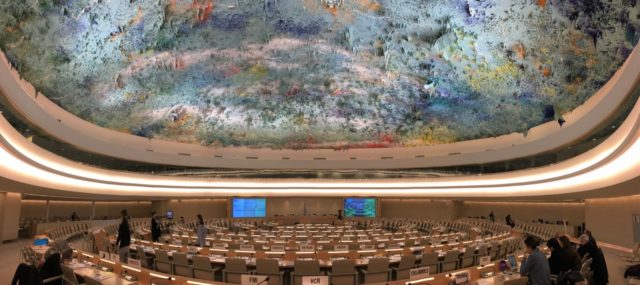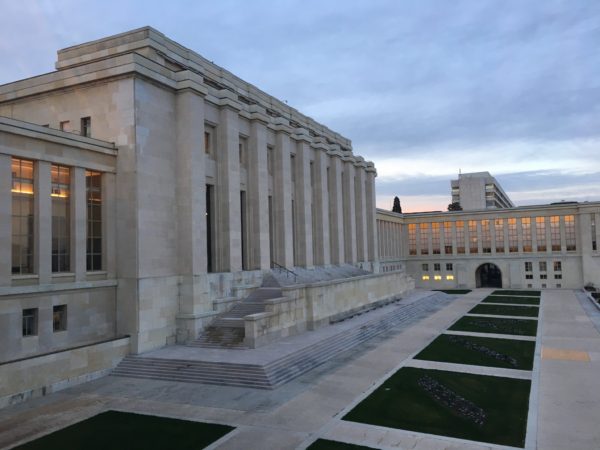Geneva, Switzerland — From 28 February to 24 March 2017, Americans for Democracy & Human Rights in Bahrain (ADHRB) participated in the 34th Session of the United Nations Human Rights Council (HRC), raising concerns over a variety of human rights abuses being commited by the governments of Bahrain, Saudi Arabia, and other Gulf Cooperation Council (GCC) states. ADHRB delivered 24 oral interventions, held two side events, and met with a number of states and UN Special Procedures mandate holders. Many of the concerns raised by ADHRB during the session were echoed by UN officials, NGO representatives, and Member States alike.
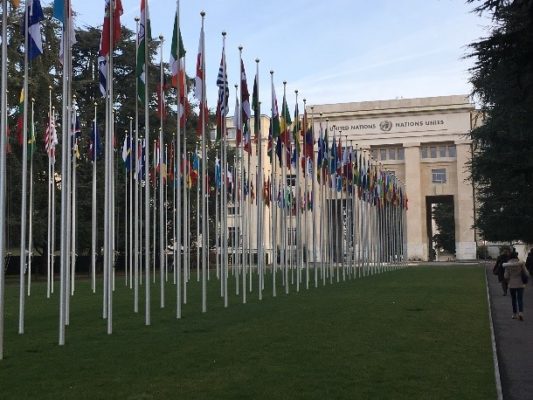
ADHRB began its efforts on 28 February by responding to the statement delivered by the Government of Bahrain during the High Level Segment of the HRC. ADHRB responded strongly to Bahrain’s claims of having made important reforms, pointing out instead that human rights conditions in Bahrain are at their lowest point in years. In fact, the Government of Bahrain in recent months has reversed on key reforms rather than implementing new ones: in January 2017, Bahrain reneged on a key BICI recommendation by restoring arrest powers to the National Security Agency, which was involved in the arbitrary arrest and torture of protesters in 2011. The government has also continued to target civil society, close off space for political opposition, engage in religious discrimination, use counter-terror laws to target activists and human rights defenders, and allow such abuses to occur without holding offenders accountable. In recent days, the Government of Bahrain has conducted reprisals against Bahraini activists participating in the HRC by targeting their families at home.
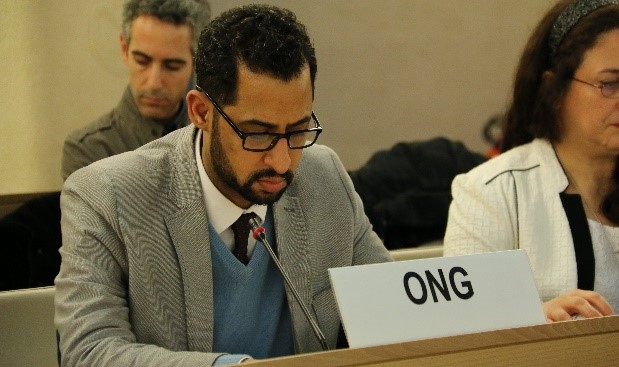
On 2 March, ADHRB began delivering oral interventions, beginning with a statement made during the Interactive Dialogue with the Special Rapporteur on housing. Speaking on behalf of ADHRB and the Bahrain Institute for Rights and Democracy (BIRD), Yusuf al-Hoori highlighted concerns over Saudi Arabia’s intention to demolish historically and culturally significant homes and buildings in the 400+ year-old al-Masora district in the town of Awamiyah. The Saudi government has forcefully evicted residents, and its actions are likely to cause increased levels of poverty in the area while contributing to a pre-existing housing shortage.
The next day, ADHRB and BIRD spoke during the Interactive Dialogue with the Special Rapporteur on torture and the Special Rapporteur on human rights defenders. The intervention highlighted Bahrain’s systematic use of torture, its ongoing crackdown against and arbitrary detention of human rights defenders — including Nabeel Rajab — and security forces’ widespread use of excessive force in response to peaceful protests.
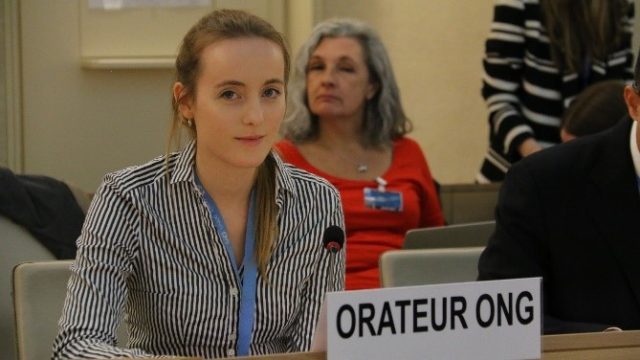
On 6 March, ADHRB’s UN Liaison Amanda Milani spoke on behalf of ADHRB and BIRD during the Interactive Dialogue with the Special Rapporteur on cultural rights and the Special Rapporteur on counterterrorism. The intervention pointed out that the Government of Bahrain has abused cultural rights, including by demolishing the Pearl Roundabout in Manama. The Roundabout was a central location in the 2011 pro-democracy protests, and since its demolition the government has sought to erase the icon from Bahrain’s collective memory, going so far as to rewrite textbooks and removing coins featuring its image from circulation. ADHRB and BIRD further raised concern over Bahraini authorities’ failure to align its counter-terrorism measures with its human rights obligations. In addition to the restoration of the NSA’s arrest powers, Bahrain also makes use of an overly-broad legal definition of terrorism in order to restrict free expression and assembly and target political dissidents.
Ebrahim Demestani also delivered an oral intervention on 6 March on behalf of ADHRB and BIRD. He spoke during the Interactive Dialogue with the Special Rapporteur on disabilities, highlighting Bahrain’s failure to provide comprehensive legislation protecting the rights of disabled prisoners, despite the government’s ratification of the Convention on the Rights of Persons with Disabilities. Bahraini security forces have tortured and denied medical treatment to the disabled academic and human rights activist Dr. Abduljalil al-Singace, who Bahraini authorities sentenced to life in prison in 2011 over his participation in peaceful protests.
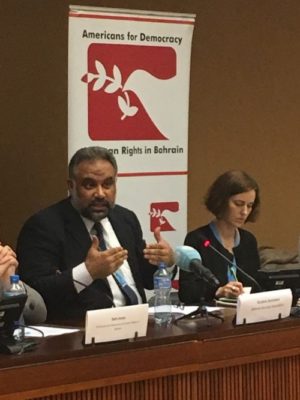
ADHRB, along with ten co-sponsors, held its first side event of the HRC session on 7 March. The event marked the official launch of ADHRB, BIRD, and BCHR’s report entitled Bahrain’s Third Cycle UPR: A Record of Repression, and featured a panel discussion with ADHRB’s Sam Jones, BCHR’s Julie Gromellon, BIRD’s Sayed Ahmed Alwadaei, a representative from Reprieve, and Ebrahim Demestani of the Bahrain Nursing Association. The discussion began with observations that are contained in ADHRB’s Third Cycle UPR report, namely the fact that the Government of Bahrain has demonstrated either an inability or a plain unwillingness to implement any of the 176 UPR recommendations it was given in 2012. The panelists also focused on Bahrain’s resumption in carrying out the death penalty, the failure of its national human rights institutions to operate independently, and the government’s abuse of peaceful protesters. Demestani and Alwadaei, both of whom were arrested, tortured, and imprisoned by Bahraini authorities for their role in the 2011 pro-democracy protests, discussed what it is like to be a protester calling for change in Bahrain.
ADHRB and its partners also delivered two oral interventions on 7 March. The first came during the Interactive Dialogue with the Special Representative of the Secretary-General on combating violence against children. The intervention, delivered by ADHRB Advocacy Fellow Tyler Pry, expressed deep concern over Saudi Arabia’s continued arbitrary detention and torture of minors, including Ali al-Nimr, Dawood al-Marhoon, and Abdullah al-Zaher. All three have been sentenced to death for crimes allegedly committed as minors. Tyler also called attention to the conduct of the Saudi-led coalition in Yemen, which has consistently attacked schools and hospitals, resulting in the killing and maiming of children.
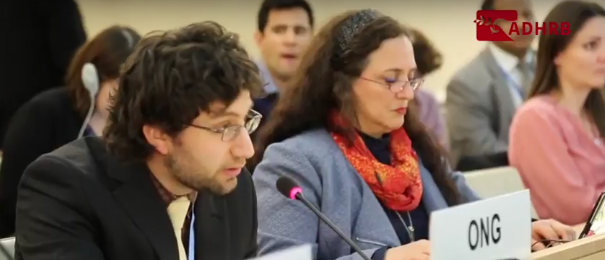
In its second intervention on 7 March, ADHRB spoke out about Bahrain’s systemic discrimination against its majority Shia population during the Interactive Dialogue with the Special Rapporteur on freedom of religion. Most recently, the Bahraini government has launched a campaign of judicial harassment against 70 Shia religious leaders, including Sheikh Isa Qassim, the country’s most prominent Shia cleric. The Bahraini government also continues to perpetuate long-running institutional discrimination against its Shia population. Shia are often excluded from social services, are virtually barred from important senior government positions, and almost entirely prohibited from joining the country’s security forces.
On 8 March, UN High Commissioner for Human Rights Zeid Ra’ad al-Hussein delivered his report to the HRC session, during which he expressed deep concern over “increasing levels of human rights violations” in Bahrain and called on the government to address these abuses. High Commissioner Zeid specifically mentioned Bahrain’s decision to resume use of the death penalty, as well as the government’s increased restrictions on civil society and political space, which include “intimidation, arrests and interrogations, travel bans and closure orders.” ADHRB, along with other Bahrain-focused NGOs, issued a statement welcoming the High Commissioner’s remarks and reiterating his call for the Bahraini government to allow UN special procedures mandate holders into the country. Bahrain has refused to allow such visits since 2006.
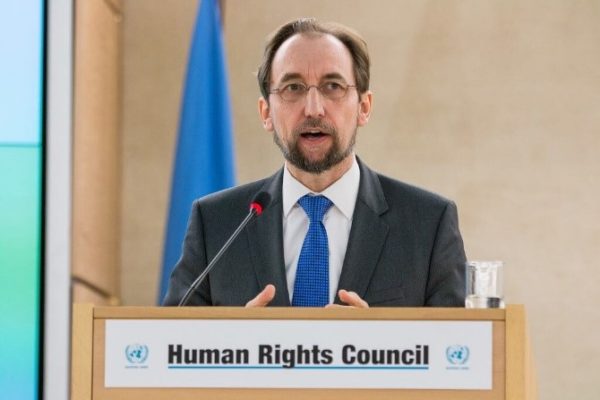
Following the High Commissioner’s report on 8 March, ADHRB’s Sam Jones delivered an oral intervention during the Interactive Dialogue with the Special Rapporteur on the right to privacy. ADHRB’s intervention highlighted the wide-ranging legislation used in GCC states to monitor the online activity of human rights defenders and, ultimately, to silence them. In particular, authorities in Bahrain, the UAE, and Saudi Arabia combine restrictive cybercrime laws with expansive anti-terror laws to increase surveillance and criminalize acts of free expression. In each country, activists, bloggers, journalists, and academics have been imprisoned for their online activity.
Jones also delivered an intervention on behalf of ADHRB, and BIRD during the 8 March Panel Discussion on Access to Medicines, during which he highlighted the trouble faced by stateless bidoon populations in seeking access to healthcare in the Gulf States. Across the region, states continue to fail to recognize the legal status of bidoon persons, which in turn results in bidoon populations being denied access to state-sponsored medical care. Governments across the region also deny adequate medical care to political dissidents, especially those that are in prison. In Bahrain, authorities have recently transferred control of the country’s public health facilities and ambulatory services from the health ministry to the military and the police. This has interfered in medical care and prevented injured protesters from accessing medical treatment.
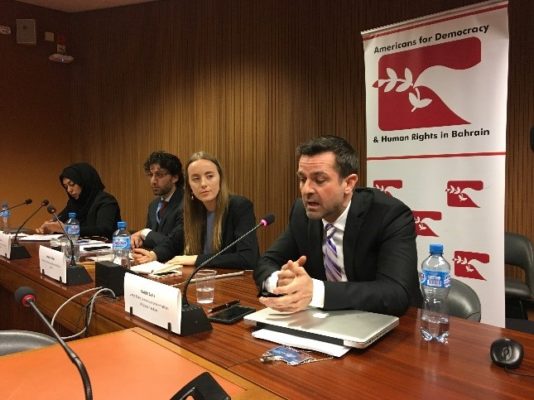
ADHRB, along with six co-sponsors, held its second HRC side event on 9 March to mark the release of the ADHRB and BIRD report entitled Voice for the Voiceless: Religious and Cultural Discrimination in Saudi Arabia. The event also included a panel discussion featuring ADHRB’s Tyler Pry and Amanda Milani, Zena al-Esia of the European-Saudi Organisation for Human Rights (ESOHR), Dewany’s Hassan al-Amri, and Dwight Bashir of the U.S. Commission on International Religious Freedom. The panel focused on religious and cultural rights in Saudi Arabia. The Saudi state uses religion as a mechanism of social control, and the country’s religious establishment exerts a great deal of influence over state law and practice. Shias are excluded from this establishment and are stigmatized by its members, which contributes to the permeation of anti-Shia bias throughout all aspects of Saudi government and society. The Saudi government actively inhibits Shias’ ability to practice their religion and has carried out a campaign of targeted destruction of Shia religious, cultural, and historic sites. While reform efforts like Saudi Arabia’s Vision 2030 offer some basis for cautious optimism, the country’s actions on the ground continue reflect a policy of institutionalized abuse and marginalization.
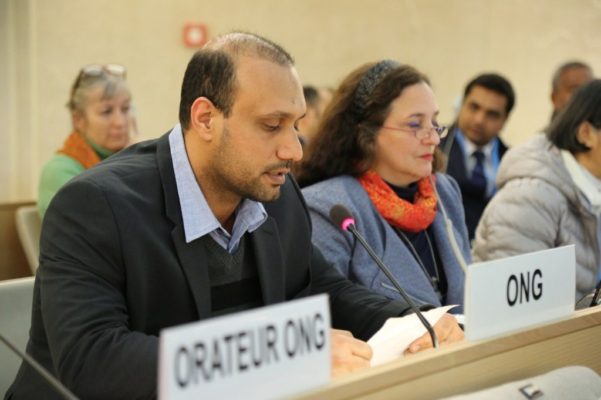
The Interactive Dialogue with the Special Rapporteur on the environment also took place on 9 March. Jaffar Yahya delivered an oral intervention on behalf of IDO and ADHRB. Yahya’s remarks focused on land reclamation and its effects on local populations and the environment. The Bahraini government has carried out land reclamation projects over many decades that have destroyed the country’s coastline and its ecosystem. This has hurt the population of the village of Ma’ameer, for example, the population of which has historically relied on the fishing industry. Land reclamation projects have contributed to the destruction of at least 90% of Bahrain’s fisheries, and Ma’ameer has come to see some of the highest levels of poverty and unemployment in the country. Nevertheless, the Bahraini government has failed to take steps to help the community.
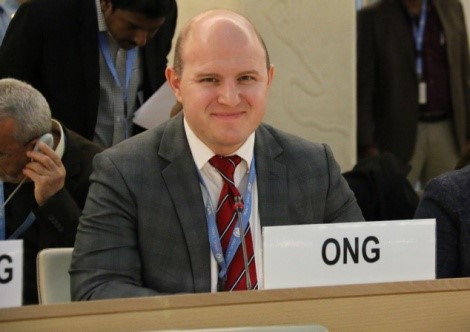
Later the same day, ADHRB’s International Advocacy Officer Michael Payne delivered an oral intervention on behalf of ADHRB, BIRD, and the Bahrain Center for Human Rights (BCHR) during the Interactive Dialogue with the UN High Commissioner for Human Rights. Payne’s comments touched upon a number of Bahrain’s recent human rights abuses, including its execution of torture victims, targeting of human rights defenders, discrimination against its Shia population, and the reversal of its limited post-2011 record of reform.
On 10 March, Ebrahim Demestani delivered an intervention during the HRC Item 3 General Debate on Bahrain. Demestani highlighted that UN Special Procedures have raised serious concern over reports of human rights abuses in six separate communications with the Bahraini government. Recalling the frequency with which such concern has been expressed, Demestani reiterated High Commissioner Zeid’s call for Bahrain to allow Special Procedures mandate holders unrestricted access into the country.
An Item 3 General Debate on Saudi Arabia was also held on 10 March, during which Zena el-Esia of ESOHR delivered an oral intervention in conjunction with ADHRB. El-Esia raised concern over Saudi Arabia’s systematic use of torture to extract confessions and the government’s continued use of the death penalty, including against minors and prisoners of conscience.
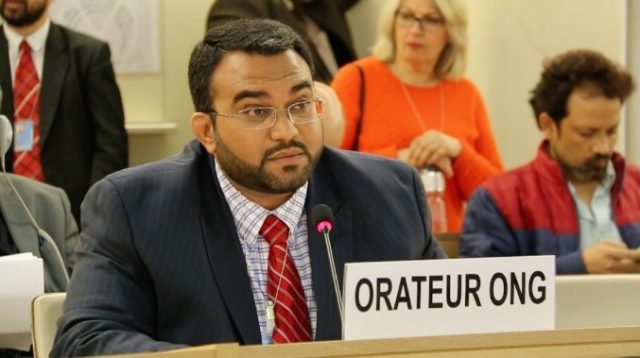
On 15 March, ADHRB’s Executive Director Husain Abdulla delivered an oral intervention during the Item 4 General Debate. Abdulla voiced concern over actions taken by the United Kingdom, particularly at the HRC, which have provided Bahrain with political cover and shielded it from substantial criticism. At this HRC, the UK has gone to great lengths to dilute any effort at raising multilateral concerns over the deteriorating human rights conditions in Bahrain, insisting instead that private diplomacy remains constructive. Abdulla strongly criticized the UK’s decisions in this regard, and urged it to disengage from its efforts to whitewash Bahrain’s abuses.
Speaking on behalf of ADHRB, BCHR, and BIRD, Ahmed Maki also delivered an intervention during the 15 March Item 4 General Debate. Maki’s comments focused on Bahrain’s execution of three torture victims as well as its decision to restore arrest powers to the NSA. Maki highlighted that these actions represent major setbacks to human rights reform in Bahrain.

On 17 March, ADHRB’s Michael Payne spoke during the Item 5 General Debate, which focuses on the work of UN human rights bodies and mechanisms. Payne expressed deep concern over Bahrain’s repeated failure to constructively engage with the Office of the High Commissioner or the Human Rights Council and its mechanisms, despite the government’s perennial statements of support for the work of these bodies. Payne also raised concerns over Bahrain’s domestic human rights institutions, including the interior ministry’s Ombudsman’s Office and the National Institute for Human Rights. Recent UN reports have called the “independence, professionalism and thoroughness” of these bodies into serious question.
Ahmed Maki also delivered an oral intervention during the 17 March Item 5 General Debate. Maki’s comments called attention to Bahrain’s ongoing acts of reprisals against individuals who engage with the HRC. This began with 2014 threats against those who attended the Council and continued with the government’s 2016 application of travel bans against all parties attempting to engage with the HRC. At the current Council, Bahraini authorities have continued this pattern of reprisals, namely by targeting the family members of activists engaged at the HRC.
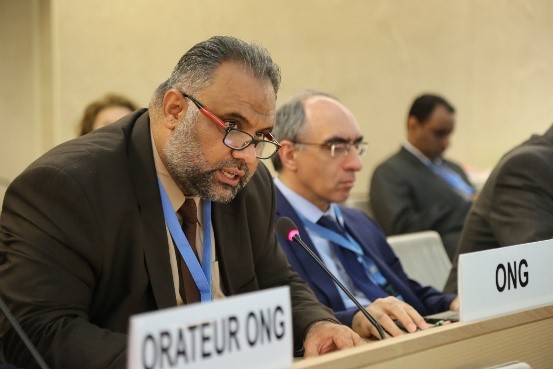
The Item 6 General Debate was also held on 17 March. Both Ebrahim Demestani and ADHRB’s Michael Payne delivered interventions during this debate, highlighting the Government of Bahrain’s unwillingness to implement its second-cycle UPR recommendations. The 176 such recommendations include ones aimed at curbing the use of torture and protecting fundamental freedoms. Instead, Bahraini authorities continue to commit these abuses unabated.
On 20 March, Nader Almatrook gave an intervention on behalf of ADHRB, BIRD, and BCHR addressing Bahrain’s failure to implement key elements of the Vienna Declaration and Programme of Action. Almatrook’s statement focused in particular on the right of self-determination, noting that the Government of Bahrain denies its majority-Shia population this rights by restricting their political participation and their parliamentary representation.
ADHRB, BIRD, and BCHR on 20 March also highlighted Bahrain’s failure to uphold components of the VDPA related to medical neutrality and access to medical assistance. An intervention delivered by Ebrahim Demestani highlighted Bahraini authorities’ record of harassing, torturing, and imprisoning medical workers who treated wounded pro-democracy protesters in 2011. Demestani also raised concerns over Bahrain’s recent steps to militarize the country’s healthcare services by transferring their control to police and military authorities.
On 21 March, Nader Almatrook delivered an oral intervention on behalf of ADHRB under Item 9, which includes a focus on discrimination and intolerance. Almatrook highlighted Saudi Arabia’s systematic oppression of its minority Shia population. Ebrahim Demestani delivered a separate intervention under Item 9 on 21 March. Speaking on behalf of ADHRB, BIRD, and BCHR, Demestani focused on Bahrain’s continued pattern of discrimination and oppression of the country’s majority Shia population. Bahraini authorities target Shia activists and religious leaders and impose severe restrictions the fundamental rights of Shias, including the rights to expression and peaceful assembly.
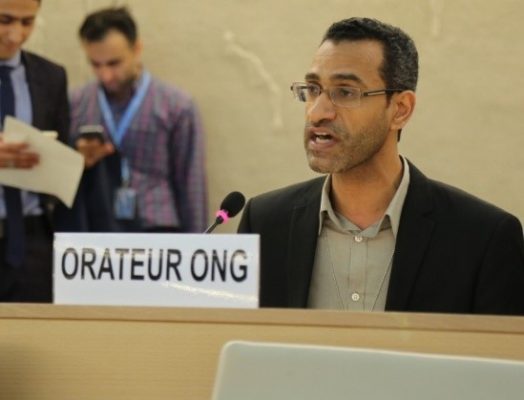
On 23 March, Nader Almatrook and Ebrahim Demestani delivered two oral interventions under Item 10 on behalf of ADHRB, BIRD, and BCHR. Almatrook’s statement focused on the Bahraini government’s failure to substantively cooperate with OHCHR, despite making public commitments to do so. The Bahraini parliament recently invited the High Commissioner to visit the country, but the government has for years denied access to OHCHR technical teams and has repeatedly delayed discussions aimed at resolving these issues. As such, Bahrain’s invitation appears to be nothing more than a rhetorical maneuver aimed at diverting attention from the government’s widespread human rights abuses.
Ebrahim Demestani’s Item 10 intervention offered support for the High Commissioner’s decision to suspend OHCHR technical assistance with the Government of Bahrain, which sends a strong message to the country’s authorities that they must commit to honoring their human rights obligations. Given the ongoing human rights crisis in Bahrain, any cooperation between OHCHR and the government without strict demands for reform will only serve to plaster over the Bahraini regime’s record of human rights violations.
